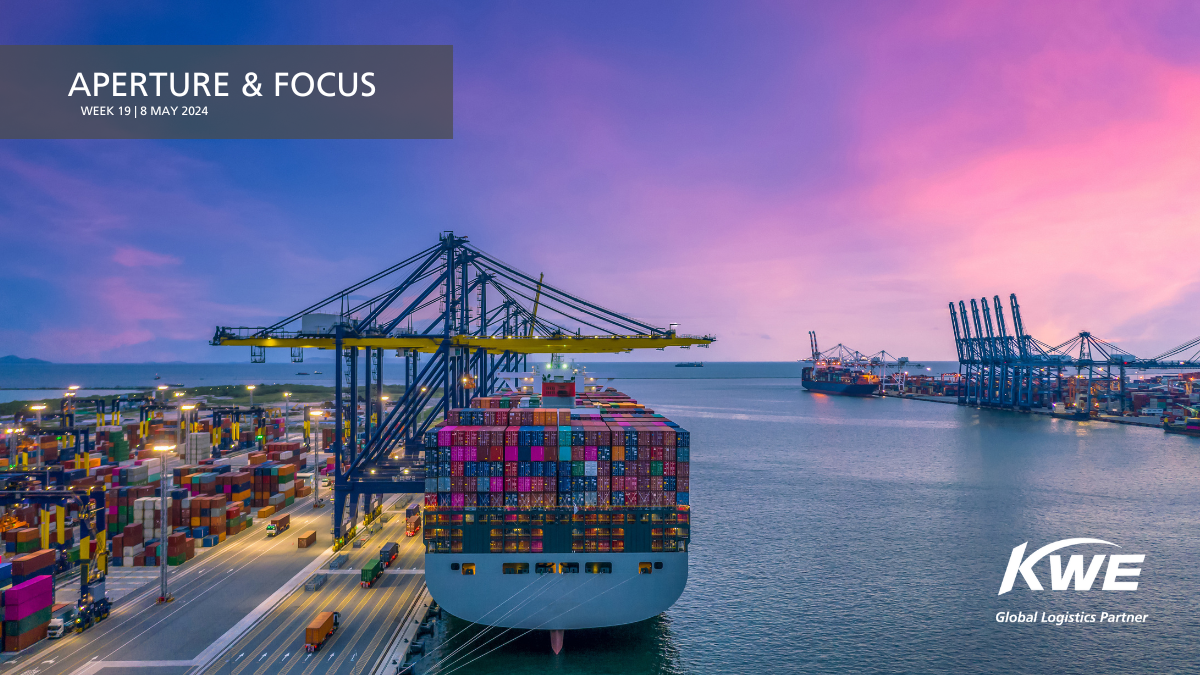Quote
Aperture & Focus 2024: Week 19

Global Aperture
Continued disruption amid the Red Sea shipping crisis is expected to reduce container capacity between Europe and Asia by up to 20% in the second quarter, according to Maersk, as ships reroute around Africa’s Cape of Good Hope to avoid Iran-aligned Houthi militant attacks. The longer routes are increasing costs, creating bottlenecks, and putting pressure on global shipping, with Maersk and other companies working to maintain reliability by leasing extra containers and using alternative ports.
The maritime shipping industry, responsible for transporting 80-90% of global goods, is under pressure to decarbonize due to its significant environmental impact, accounting for 3% of global greenhouse gas emissions. To meet evolving sustainability regulations, ship owners are turning to digital technologies and enterprise-grade connectivity solutions to optimize fuel consumption, enable proactive maintenance, and ensure peak operational efficiency, facilitating more environmentally conscious maritime operations.
Regional Focus
Americas
Air cargo volumes from Central and South America (CSA) surged in late April, particularly driven by the shipment of flowers due to the upcoming Mothers’ Day celebrations in North America. Analysis indicates a 17% week-on-week increase in air cargo volumes from CSA in week 17, with the largest rise observed in demand for the US and Canada, leading to a notable 48% increase in volumes over a two-week period.
United States: Contrary to predictions, Gulf of Mexico ports, like Houston, New Orleans, and Mobile, have maintained double-digit growth in container traffic while avoiding a decline in favor of West Coast ports. Despite congestion clearing and new labor contracts on the West Coast, traffic continues to favor Gulf ports due to increased importer concerns about East Coast labor negotiations, along with their growing investments in container infrastructure and improved rail services.
Asia-Pacific
India: Container lines are facing significant service disruptions on routes out of India due to longer voyages around southern Africa and congestion at key hub ports along major routes, forcing carriers to change port calls and adjust schedules. These disruptions are creating major challenges that have led to delayed vessel arrivals, revised cargo routing, and complicated shipment planning.
South Korea: Busan and Gwangyang ports are striving to enhance productivity and container volumes to attract major liner companies, which have favored ports in China and Singapore due to higher productivity and cost competitiveness. At a recent conference, port executives urged government intervention to improve handling rates and cost efficiency, emphasizing the need for strategic initiatives to increase container volumes and transshipments to enhance competitiveness on the global stage.
Europe, Middle East & Africa
Truck drivers in the Black Sea Economic Cooperation (BSEC) region are facing worsening congestion and delays due to increased traffic caused by geopolitical diversions, according to the International Road Transport Union (IRU). The BSEC, an intergovernmental organization aiming to promote economic collaboration among 13 countries surrounding the Black Sea, has seen its trade routes significantly affected. At the 43rd general assembly of the BSEC Union of Road Transport Associations (URTA), the IRU stressed the critical need for investment in border infrastructure and customs digital systems like eTIR (electronic Transports Internationaux Routiers) to streamline trade, ease border congestion, and minimize economic losses for the road transport industry.
Scotland: The port of Montrose in Scotland has become the first Scottish port to offer shore power service for offshore energy supply vessels, marking a significant step towards its goal of becoming a carbon-neutral port. The port invested £1 million to upgrade its infrastructure through its carbon-neutral initiative, underscoring the port's commitment to reducing emissions from vessels at dock.